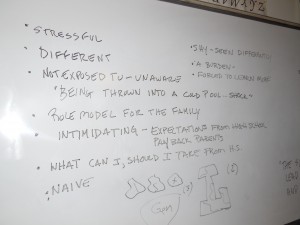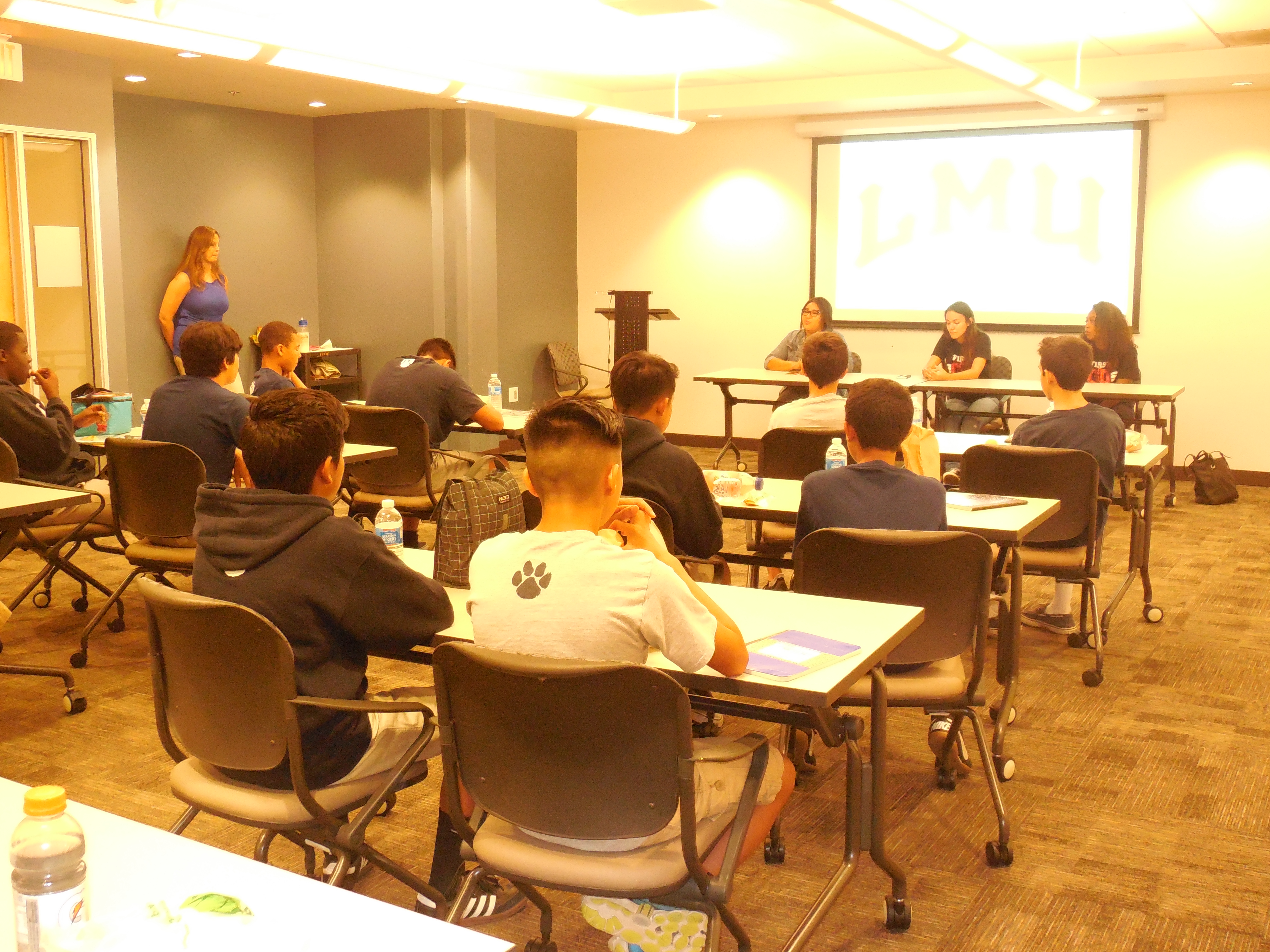The following blog post is part of our Lamps Under the Bushel Basket series focusing on Supporting First-Generation Students in Catholic Secondary Schools by Jesse Rodriguez, Gina Liberotti and Evelyn Jimenez, Loyola High School.
The students on the campus of Loyola Marymount University meeting with students from “FIRST TO GO.”
“I feel honored and scared to be the only college applicant in my family…more importantly, I feel alone in this experience.” – First-Generation Student / Incoming High School Freshman and Member of First-Generation Summer Cohort
For us in education, the summer months function as that space between the end of one school year and the beginning of a new one. It was as a graduate student studying theology where I first heard the term(s) “liminal entities.” I was reminded of this term at the start of our inaugural summer program for first-generation students entering Loyola High School as freshmen. Liminal entities are “neither here nor there; they are, by their very nature, betwixt and between the positions assigned” (Gennep; Grimes). The 15 students that accepted the invitation to participate in our program were in “between the positions assigned.” They were neither eighth graders (they had already experienced their own ritual transition of graduating) and, yet, they were not “formally” freshmen (they had yet to participate in the “freshmen welcome” with their new classmates and high school community). They existed in that transitional space and time that is summer as students in transition. There is, however, something quite powerful about transitions; it is that place of loss and creation where identity is explored and labels deconstructed. It is a time of newness and deeper exploration.
In fall 2014, two of my colleagues and I began the work of learning more about the “first-generation” student experiences of our own students. While much of what they said reinforced the literature on first-generation college students (students connected with peers and peer networks that provided resources and other non-tangible forms of support such as academic norms / identities), we knew that many of these same students had challenges “navigating” a college-prep high school. Their own transitions had been quite difficult. Although these students caught on and merged successfully into the school’s academic program, they admitted that they were at a disadvantage. What emerged as a few professional conversations, developed into a fully funded summer program for students entering Loyola High School who fit our classification of a “first-generation student” (we chose to define a “first-generation student” as “a student whose parent(s) / legal guardian(s) have not completed a BA degree, four year degree at a four year college or university in the United States). Our 15 students formed, what would be called, “College Connections I”.
The course, taught this summer over five weeks, was designed to give first-generation students entering Loyola High School with the “seamless support system” necessary to navigate successfully through Loyola High School and into higher education. Students participating in this course explored the following: 1) understanding the relationship between a productive transition into high school and sustained academic success; 2) the ability to locate resources within the school that can aid transition into college; 3) the need to build relationships with faculty and professional staff who can help facilitate students’ academic, professional, and personal development; 4) the formation of connections with other first-generation students on campus; and 5) the ability to use resources obtained through academic guidance and counseling. Ultimately, it was our hope that students might build stores of social capital by drawing on academic resources, educational resource opportunities and mentoring relationships.
Using digital storytelling to unpack the intersectionality of identities and their meanings (e.g., first-generation, African-American, Latino or other, Loyola “Cub,” and high school student in a Catholic context), students, and instructor, unpacked what it meant to be “first-generation.” It’s difficult not to reflect on my own identity as first-generation—a term (and identity) that was unfamiliar to me when I stumbled into college and, later, graduate school. Even then, as an adult pursuing a graduate degree, I lived the very definition that I shared with my students:
 imposter syndrome – feelings of inadequacy, despite evidence to the contrary. High- achieving individuals may fear being “found out” as a fraud, believing that everyone else around them possesses knowledge, skills, and competencies they do not. These individuals often feel they do not deserve the success they have achieved and downplay their accomplishments as luck or timing.
imposter syndrome – feelings of inadequacy, despite evidence to the contrary. High- achieving individuals may fear being “found out” as a fraud, believing that everyone else around them possesses knowledge, skills, and competencies they do not. These individuals often feel they do not deserve the success they have achieved and downplay their accomplishments as luck or timing.
My story resonated with the class and caused me to enter into my own period of reflection. We started our week by unpacking our identity…what does it mean to be first-generation? And what emerged were poems, essays and some art. Below are one student’s words:
“I am first-generation
We are one of a kind all across the nation
Not just statistics in a system
Breaking all kinds of barriers is my mission
Overcoming all sorts of challenges
It’s a big burden, but still I manage
All types of people try to discourage
I don’t worry because my loved ones give me courage
Keep striving to reach my dream
I Know I will with all the knowledge Loyola feeds
That’s why in the end I know I will succeed”-Xavier, Incoming Freshman Class of 2018
What impressed me most about the students were their interviews with parents and /or guardians on what education meant to them and their families. For many, this was the first time they really engaged in a serious conversation about college. Incorporating their family story was critical to deconstructing the meaning what it meant to be first (in the family) generation:
My name is Brandon and I am a member of the college connections class and the first generation association club. I would like to take a moment to share my experience in this class with all of you. It has been a great honor for me to be a part of this group. Before I entered this class, I had no idea what it meant to be a first generation college student. All I knew was that I was the only one in my family to receive an education that will lead me to college. As I progressed in the class, I began to gain a greater understanding of what it meant. I reflected a lot on my situation of not knowing anybody close to me that has gone to college and I almost felt alone in this experience. After our university field trips and many fun activities in class, I realized that I was not alone. Not only will I have help, but I will also have all my fellow classmates going through the same experience with me. I felt as if we grew closer as a family. I have never felt so comfortable to be in something new. I will always push myself to work hard and never give up. I will ask for all the help I can get so I could make the best out of my journey to college. I will do awesome things because I am first.
Transitions. Our life is full of transitions—movements from one point to another. It is in these movements that we explore our sense of place and the position and identity that we will occupy. For the 15 first-generation students, they have entered into a Catholic community that will embrace them and walk alongside them as they take the first step into becoming First-Generation Loyola Cubs.
Over the course of this coming academic year, my colleagues and I will share our “first-generation stories.” The stories will be written from different perspectives—leadership (administration), practitioners (teachers and counselors) and students (those part of the first cohort and those already students at Loyola High School). It is our hope to capture the essence of our work through this living testimony of work and reflection.
